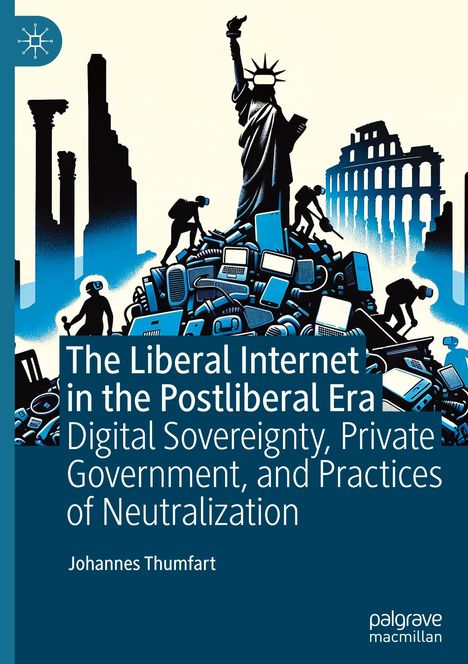Johannes Thumfart: The Liberal Internet in the Postliberal Era, Gebunden
The Liberal Internet in the Postliberal Era
- Digital Sovereignty, Private Government, and Practices of Neutralization
(soweit verfügbar beim Lieferanten)
- Verlag:
- Springer International Publishing, 09/2024
- Einband:
- Gebunden, HC runder Rücken kaschiert
- Sprache:
- Englisch
- ISBN-13:
- 9783031634253
- Artikelnummer:
- 11972141
- Umfang:
- 508 Seiten
- Gewicht:
- 763 g
- Maße:
- 216 x 153 mm
- Stärke:
- 32 mm
- Erscheinungstermin:
- 17.9.2024
- Hinweis
-
Achtung: Artikel ist nicht in deutscher Sprache!
Klappentext
This book begins with an examination of the internet as a central institution of the post-Cold War liberal order. From this starting point, Johannes Thumfart analyzes the contemporary rise of digital sovereignty in Asia and Europe, alongside the establishment of private government within digital networks. He interprets these phenomena as indications of an emerging postliberal era. Thumfart engages with a wide array of empirical research and assesses liberal ideals such as state and net neutrality by discussing thinkers like Hegel, Schmitt, Mouffe, Taylor, Sandel, Fukuyama, Anderson, Jasanoff, and Girard, as well as network and rational choice theories. He contends that the internet's reification of liberal values has, paradoxically, subverted these values and catalyzed the transition to postliberalism. Thumfart suggests that instead of adhering to the traditional liberal focus on neutrality, states should adopt the more flexible approach of neutralization to respond to the complexities of this digital and postliberal era.
Biografie
Johannes Thumfart, geb. 1978, studierte Philosophie und Geschichtswissenschaften in Berlin. Als Stipendiat der DFG forschte er in Berlin, Paris und Madrid über Francisco de Vitoria. Er schreibt regelmäßig für die Süddeutsche Zeitung, das Lodown Magazine, die Online- Ausgabe der Zeit und das New Yorker Modemagazin Hint. Seine wissenschaftlichen Beiträge wurden im »Archiv des Völkerrechts« und der »Zeitschrift der Savigny Stiftung für Rechtsgeschichte« veröffentlicht.
